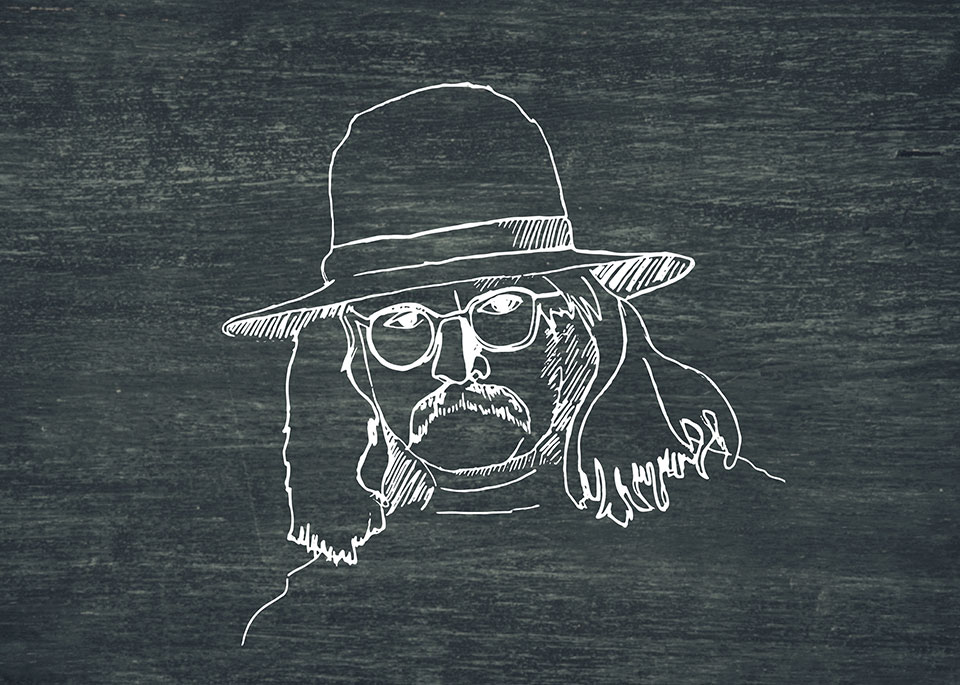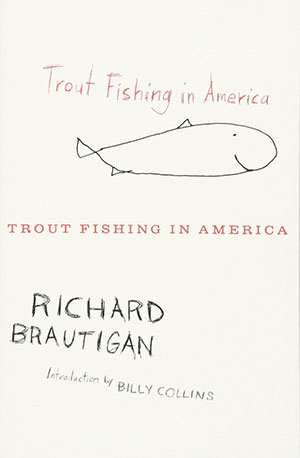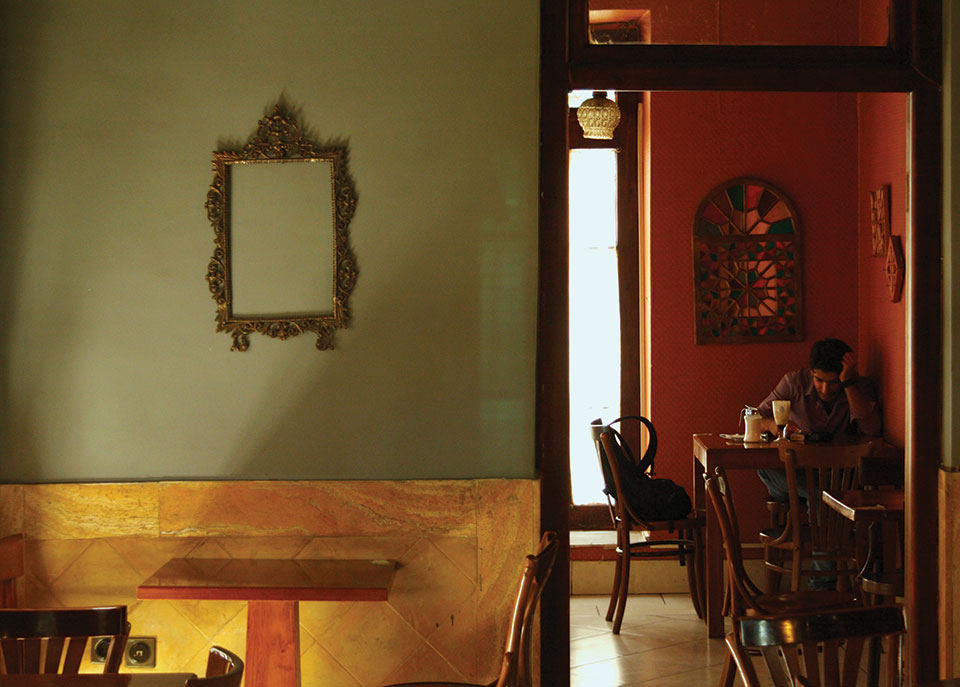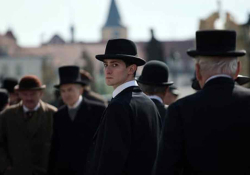Trout Fishing in Tehran

On the fiftieth anniversary of Richard Brautigan’s Trout Fishing in America, an Iranian writer (and devoted Brautigan reader) considers how he, perhaps even more than other Beat writers, achieved a wide readership in Tehran.
The story of how I met Richard Brautigan in Tehran begins in 2011, when I attended a film workshop where many American movies were shown and analyzed by Iranian critics. One of the films presented was Oliver Stone’s Platoon (1986), which, I believed, depicted the truth of the Vietnam War and the traumas suffered by American soldiers, and to be honest, Platoon was the only reason I attended the workshop in the first place.
Here’s what happened. They showed the film, the critics began discussing it, and I was enjoying the conversation well enough until a guy with a large retro-western mustache, seated in the rear of the room, began asking questions. The guy’s retro-western mustache was so remarkable that I have completely forgotten whatever it was he asked of the critics. After the discussion broke up, I stayed behind to talk to one of the critics about the film program I was managing as a student at my university.
 Before I left, I heard a voice behind me: “Do we know each other? I feel I’ve seen you somewhere before.”
Before I left, I heard a voice behind me: “Do we know each other? I feel I’ve seen you somewhere before.”
It was the guy with the retro-western mustache, and he explained that he had seen me at my school, where he too was enrolled. I have always had my doubts about the idea of coincidence—but it seemed to work well for me and the guy with the retro-western mustache. That night, we had a long conversation about cinema and literature, and we stayed in touch by text messages, chatting at length about the United States and its cinema. Mustache guy had many cousins who lived in the States, and he knew a lot about the land of Martin Luther King and Malcolm X. Of course, we began dating and attending workshops together, and mustache guy lent me many of his American postmodern novels.
But, Dear Readers, this is not a love story about me and the guy with the retro-western mustache. It’s a story about how mustache guy introduced me to Richard Brautigan.
In those cafés in downtown Tehran, it seemed as though the writers of the Beat and Woodstock generations had paid a visit, had come to Tehran and left something behind that changed it forever.
It all started with So the Wind Won’t Blow It All Away, which mustache guy gave me. So the Wind Won’t Blow It All Away is Brautigan’s final book, published two years before he committed suicide by shooting himself in the head, and leaving behind perhaps the world’s most famous suicide note: “Messy, isn’t it?” The book is about a forty-two-year-old man narrating his childhood, from the ages of five to twelve, in post–World War II America. I liked the book mostly due to its simple style and friendly tone. Brautigan reminded me of Hemingway—short direct sentences with little detail, and somehow you could tell that he’d had no academic education. It was as though he was the product of American pop culture.
I was fascinated by So the Wind Won’t Blow It All Away, so from there I set out to find the rest of Brautigan’s books in Tehran bookstores. This wasn’t difficult. Richard Brautigan is extremely popular in Iran, even though he is not taught in universities. You can easily find photos of him on the walls of Tehran cafés, with his typewriter and his lovely smile, and of course he was inspiring retro-western mustaches in certain Iranian men. I spent a lot of time in cafés in those days, meeting many other young men and women who were into art and literature. We gathered in the cafés to discuss Kerouac, Ginsberg, Burroughs, Vonnegut, J. G. Ballard, and Brautigan—the last more popular than the others. He was always there, hanging on the wall and watching me while I read his books. In those cafés in downtown Tehran, it seemed as though the writers of the Beat and Woodstock generations had paid a visit, had come to Tehran and left something behind that changed it forever.

What struck me most about those café conversations was that the men and women who were having them—barely more than boys and girls, really—were not English literature students, as I was. They studied art or cinema, and they read Brautigan in Farsi, and Brautigan had a dramatic impact on them. Many of them looked very westernized. The men had long hair, and some wore mustaches, some not. Some wore weird glasses, and most of them smoked cigarettes.
Among the photographs of all those writers, Brautigan’s stood apart, perhaps because his image embodied his minimalistic writing. Brautigan entered the literary world through poetry—and there is a strong bond between his poems and his novel-writing. His novels would never have been written had he not written poetry first. And even his poetry focused more on daily life, as opposed to the more issue-based writing of the other Beat and Woodstock writers. I read somewhere that Brautigan had always longed to be famous and to have many Dear Readers to read his books. This might have become truer of him here in Tehran than in the United States. There are a slew of characteristics that have made him a major author in Iran: existentialism, identity crises, consumer society, the environmental crisis, the idea of self, Zen philosophy, choosing a lifestyle opposed to the American dream, repetition, his poetic style, his haikus, grotesque characters from the suburbs, death, imagery, Transcendentalism and the impact of Emerson, silence, and the strange relationship between his titles and the bodies of his stories—by which I mean, most often there was no connection at all between the two.
For example, An Unfortunate Woman.
 An Unfortunate Woman is a travelogue based on Brautigan’s daily life and refers only briefly to the suicide of a female friend. It mostly focuses on Brautigan’s journey during his last few months before death, and the setting is the cafés and restaurants where he spent much of this time and also his farm in Montana. Apart from the female friend, there is no unfortunate woman in the entire story.
An Unfortunate Woman is a travelogue based on Brautigan’s daily life and refers only briefly to the suicide of a female friend. It mostly focuses on Brautigan’s journey during his last few months before death, and the setting is the cafés and restaurants where he spent much of this time and also his farm in Montana. Apart from the female friend, there is no unfortunate woman in the entire story.
Fortunately, I am self-taught in Brautigan; my professors had no idea about him. I remember well the bitter days in my American literature classes when we barely touched the works of postmodern authors. Our literary translation workshop read and translated everything but American postmodern literature. I was left very depressed, and I took to sitting in the last row of class to read Brautigan while my professors lectured on and on. Dear Readers, I was a very naughty student! Some of my professors insisted that I sit in the rear of the class, and this was how I could be alone with my Brautigan. It was here, as an unfortunate woman myself, that I first read An Unfortunate Woman.
Two years later, I was no longer with the guy with the retro-western mustache, but I had amassed a collection of the works of Richard Brautigan. 2017 marked the fiftieth anniversary of Trout Fishing in America, but to be honest, it’s not my favorite. It’s the others that found their way to me in Iran, and for that I feel very fortunate indeed.
Tehran











